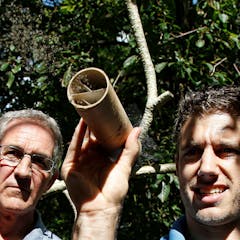
Articles on Zika
Displaying 1 - 20 of 106 articles

Methods that don’t rely on insecticides are needed to bolster the fight against mosquito-borne diseases.

France experienced its largest outbreak of ‘native’ dengue this summer. Thanks to climate change, Europe can expect more of the same.

It is estimated that half of world’s population is at risk of being infected by an arbovirus.

Certain viruses like dengue and Zika can make their hosts smell tastier to mosquitoes. Luckily, vitamin A and its derivatives may help combat these odor changes.

Genes and environments almost always combine to influence our risk of diseases. Research in twins has helped us understand how.

A new study shows that the pesticide pyriproxyfen – widely used in Brazil during the Zika outbreak of 2015 – could disrupt thyroid hormones and thus affect brain development in children.

Plus, why Brazilian women who lived through Zika are avoiding getting pregnant during the COVID-19 pandemic. Listen to episode 18 of The Conversation Weekly podcast.

Officials in Brazil recently asked women to avoid pregnancy, citing heightened risk to them and newborns. But births were already dropping; a new study attributes it to the trauma of Zika.

Gene drive guarantees that a trait will be passed to the next generation. But should society use this tool to control insect populations?

Release of GM mosquitoes in Florida is imminent. But a multidisciplinary team of scientists believe that more studies are needed first. They encourage a publicly accessible registry for GM organisms.

Covid-19, like other major epidemics, is not unrelated to the biodiversity and climate crisis we are experiencing.

The tremendous costs of COVID-19 show why the world needs to do a better job preventing epidemics from occurring – or at least mitigate the impact.

The declaration does not mean the risk to Canadians has changed, but it does mean Canada must step up to help those countries with weaker heath-care systems.

Nuisance-biting and mosquito-borne disease are ongoing concerns for health authorities. But an effective citizen science program is now showing how all of us can help beat the bite of mozzies.

There’s a big market for new treatments for TB, malaria and other ailments. But most of these diseases afflict low-income people unable to pay for medicine.

Timing is everything when it comes to making a decision about declaring a disease outbreak a public health emergency of international concern.

New survey of insect-borne disease in Venezuela.

In January, measles returned to the Pacific Northwest, while Ebola resurged in the Congo. It would take a lot more research for scientists to be able to stop threats like these in their tracks.

Researchers are exploring genetic forms of population control called gene drives that spread traits faster that happens naturally. The goal is to curb mosquito-borne diseases like malaria.

Japanese encephalitis virus is rare and doesn’t usually cause symptoms. But in a small proportion of cases it can result in long-term neurological impairment and death.
